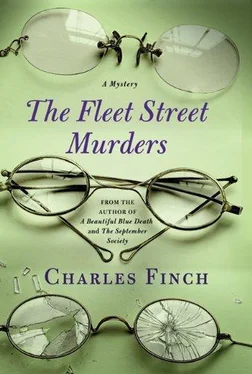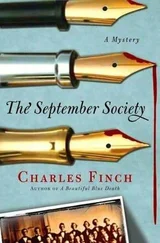Charles Finch - Fleet Street murders
Здесь есть возможность читать онлайн «Charles Finch - Fleet Street murders» весь текст электронной книги совершенно бесплатно (целиком полную версию без сокращений). В некоторых случаях можно слушать аудио, скачать через торрент в формате fb2 и присутствует краткое содержание. Жанр: Исторический детектив, на английском языке. Описание произведения, (предисловие) а так же отзывы посетителей доступны на портале библиотеки ЛибКат.
- Название:Fleet Street murders
- Автор:
- Жанр:
- Год:неизвестен
- ISBN:нет данных
- Рейтинг книги:5 / 5. Голосов: 1
-
Избранное:Добавить в избранное
- Отзывы:
-
Ваша оценка:
- 100
- 1
- 2
- 3
- 4
- 5
Fleet Street murders: краткое содержание, описание и аннотация
Предлагаем к чтению аннотацию, описание, краткое содержание или предисловие (зависит от того, что написал сам автор книги «Fleet Street murders»). Если вы не нашли необходимую информацию о книге — напишите в комментариях, мы постараемся отыскать её.
Fleet Street murders — читать онлайн бесплатно полную книгу (весь текст) целиком
Ниже представлен текст книги, разбитый по страницам. Система сохранения места последней прочитанной страницы, позволяет с удобством читать онлайн бесплатно книгу «Fleet Street murders», без необходимости каждый раз заново искать на чём Вы остановились. Поставьте закладку, и сможете в любой момент перейти на страницу, на которой закончили чтение.
Интервал:
Закладка:
“Walk us through it all one time,” said Dallington. “Won’t you, Charles?”
So Lenox again told the narrative, beginning with the dead maid in George Barnard’s house, which seemed like decades ago, and then running through Gerald Poole, through Ye Olde Cheshire Cheese, through Mr. Moon, through his emergency trip from Stirrington to London, and ending with his confrontation at the Mint, loosening for his friends the delicate threads that tied the whole nasty business together.
“Well,” said Jenkins at length, “it’s all fearfully complicated. We’ll need to speak again, no doubt, but at the moment I must be off.”
“I’m going, too,” said Dallington. “I’m dead tired.”
“Off to sleep?” asked Lenox.
Dallington shifted from one foot to the other. “Newgate, actually.” He picked up his hat. The white carnation, the eternal marker of his compact dapperness, stood in his breast. “Bye, then.”
The two men left, and only Graham and Lenox remained.
“He’s going to see Gerald Poole, poor lad,” said Lenox.
“What will become of him, sir?”
“Of Poole? I don’t know. I hope he doesn’t hang for it, with all my heart.”
“Indeed, sir. If I might ask”-Graham spoke gingerly, his quick intelligence looking for the most delicate words-“what are your plans? At the moment?”
Lenox laughed. It was typical of Graham’s tact to ask an ambiguous question, one that might have been about either whether he wanted another cup of coffee or whether he was pulling up roots to pan for gold in the wilds of California.
“We were going to go to Morocco, weren’t we?”
Indeed, they had intended to, although as it so often did in his life his wild imaginings about the journey he wanted to take had been blocked off by reality.
“Yes, sir, we had discussed it,” said Graham. “Although if-”
“No,” said Lenox firmly. “We must go. Have you bought the tickets? Spring, I think.” Aside from greatly anticipating the fun of the trip, the symbolism of it meant something to Lenox-a final bachelor jaunt, a final trip that the two friends, who had for twenty years seen each other nearly every day, could make together.
“Yes, sir.” Graham smiled. “If you’ll excuse me, I must return to the East End, sir, to see about the skiff.”
“Why don’t you sleep first?”
“With your permission, I would rather go now, sir. I left a note at the pier but fear it may not be sufficient to quiet the owner’s worry.”
“As you please, of course. You have enough to offer him? I jolly well hope there wasn’t anything of his on board,” said Lenox. “Here, take a bit more money.”
So Graham left, and Lenox, though tired, wished as soon as he was alone to see Lady Jane. He straightened his admittedly disarrayed habiliment and walked next door.
Jane was in her drawing room, perched upon her famous rose-colored sofa, having a cup of tea.
“Hello, Charles!” she said, greeting him. “I’m so happy to see you.”
“You, too-happier than you know!”
“Oh? I’ve just woken up from the most wonderful rest, you can’t imagine,” said Lady Jane, yawning in a self-consciously demure fashion, then laughing at herself.
“I’m glad of it. I, on the other hand, was shot at more than once last night.”
“What!”
Lenox hastened to ease her mind, promising her that he had never been in real danger-which was, of course, something of a fib-and then explaining the entire strange circumstance of his encounter with George Barnard.
“Imagine it,” she said wonderingly. The shock was written on her face. “One saw him everywhere. I daresay I’ve known him for a decade!”
“Yes,” said Lenox grimly. “It’s a bad business.”
“Thank goodness I was never close to him. I didn’t accept, of course, but you know he wanted to marry me!”
“I can’t entirely fault him for that, I must say.”
Lady Jane laughed and kissed Lenox on the cheek. “You’re a dear,” she said, though she still looked baffled, even slightly haunted, by the revelation of Barnard’s character. “Although, were you really safe?”
Over the next few days, the history of Inspector Jenkins’s pursuit of George Barnard became public, and Barnard exchanged the name of the man who had murdered Inspector Exeter for the promise that he wouldn’t die for his crimes. The instant and total hatred of the Hammer Gang was his other prize, and rumors of a fabulously large bounty on Barnard’s head grew. He lived in deep solitude in Newgate Prison, allowing his food to come only in the hands of a certain waitress at a fashionable restaurant, refusing all visitors, and by all accounts rejecting any other kind of cooperation with the Yard.
The case became remarkably famous in a very short time; Lenox was just able to manage his absence from the reports, and in not very much time at all, perhaps seventy-two hours, Jenkins had been promoted to chief inspector, at least partly as a memorial to Inspector Exeter.
If there was a fallout in Fleet Street, it was nothing to the swift and ceaseless chatter of the upper classes, who moved between dinner parties in Belgravia and Berkeley Square, propelled out in the terrible cold only by a desire to commiserate with their friends over the late, despised George Barnard-for he could not have been more dead to them if he were dead.
“I never had him in my house,” sniffed many great ladies, though it must be owned that the great majority of them had. Meanwhile the men in their clubs chomped fretfully on cigars and said things like, “Damn country is going to hell, been saying it for years. I expect the French to invade by the hour, I tell you,” which was very consoling and pleasant to contemplate.
George Barnard had, in fact, eventually become part of London’s highest society. His ball, an annual event of great significance, had hosted royalty, and his country house in Surrey had given shooting to any number of dukes, who had fairly lined up in past years to slaughter his game. Yet he went entirely unmourned, for he had never precisely been one of them. As Lady Jane put it so succinctly, it was hard to see whether he reflected worse on them or they on themselves. The few people who couldn’t help but own up to acquaintance with Barnard, because in better days they had drunk gallons of his champagne and sworn lifelong friendship with him, insisted strenuously that it had all been financial-that they had simply been friends “in the City”-which was some marginal exoneration.
None of this concerned Lenox very much. He was constantly closeted with Jenkins, and sometimes Dallington and McConnell as well, and soon the assizes met. They convicted George Barnard and Gerald Poole within forty-eight hours of each other. The former would never leave prison; the latter was told he had to go to the colonies for a period of not less than fifteen years. The only people who saw him off at the dock were Dallington and one very old woman, who kept calling him by his father’s name, Jonathan.
Martha Claes disappeared. She had promised to testify against Poole but had fled in the dark of the night, past-well, past a sleeping constable, who was situated outside of Carruthers’s rooms and didn’t hear her drag her family and their things out of the door. There was a watch for her on the train lines and at the ferry ports of the south coast, but eventually everyone concluded that one of the country’s vast cities, Leeds or Liverpool or Birmingham or Bristol, had swallowed her and her family up and wouldn’t regurgitate them any time soon.
Finally, it emerged that the poor, splintered skiff had been the property of a chap named Frank Pottle, who lived on the river, a junk and trash collector who found stuff along the Thames and fixed it to sell. Far from being angry, he was ecstatic that his property had been part of such excitement, and according to Graham, Pottle was the hero of every bankside pub in London; he hadn’t bought himself a drink in several days. He received the money to replace his skiff with good grace (and in frankness it was more than the skiff was worth, which improved his outlook on the matter) but vowed that it would be put toward a different use-he wanted to open a gin bar and mingle the satisfactions of his personal life with those of a public career.
Читать дальшеИнтервал:
Закладка:
Похожие книги на «Fleet Street murders»
Представляем Вашему вниманию похожие книги на «Fleet Street murders» списком для выбора. Мы отобрали схожую по названию и смыслу литературу в надежде предоставить читателям больше вариантов отыскать новые, интересные, ещё непрочитанные произведения.
Обсуждение, отзывы о книге «Fleet Street murders» и просто собственные мнения читателей. Оставьте ваши комментарии, напишите, что Вы думаете о произведении, его смысле или главных героях. Укажите что конкретно понравилось, а что нет, и почему Вы так считаете.












